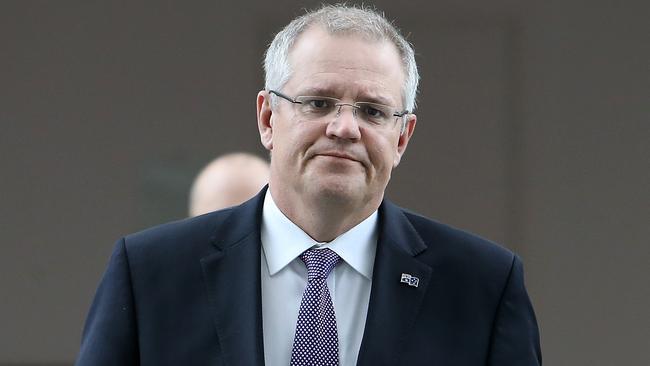Oil, gold rises pose dilemma for Scott Morrison over Budget
THE world really did change on November 8 US time — November 9 Down Under — with the election of Donald Trump, writes Terry McCrann.
Terry McCrann
Don't miss out on the headlines from Terry McCrann. Followed categories will be added to My News.
THE world really did change on November 8 their time — November 9 Down Under — with the election of Donald Trump. There are two critical things to understand for your investments.
The first is that “the change” is coming in two different time segments.
The first segment started on the election day itself — the way investors and indeed the world more generally reacted to the surprise result.
All the “experts” predicted a market cataclysm if Trump won. The cataclysm was going to be even more devastating because “no one” expected him to win and Wall St had already soared on the basis of the “certain” Hillary Clinton victory. The bigger the rise, the bigger the feared fall.
Except of course, as we now know, the exact opposite happened. After that initial plunge on Wall St — importantly, it took place in futures markets before normal trading actually opened on the day after the election — Wall St then took off.
It’s now risen a healthy 4 per cent so far this month — a combination of the rise on the certainty of a Hillary victory and then the yet further rise on the reality of the Donald one. That, in itself, should tell you to take all “expert predications” with more than few grains of salt.
The second time segment actually starts some time after January 20 — when we actually get to the Trump presidency. Not just President Trump, but his entire administration and the way it “works” with Congress.
Yes, he also “has” Republican majorities in both houses, the Senate and the House. But it does not work in the US the way it does in Australia.
President Trump could find it just as hard to get some things through his senate as Prime Minister Malcolm Turnbull does with our Senate.
Between 2008 and 2010, President Obama had Democrat majorities in both houses but he certainly didn’t get all he wanted.
So just as the reality of what happened in global markets after the election turned out to be very different to what had been predicted beforehand, the same applies to life after January 20.
Indeed, we could see a very similar replay: that a “predictable Trump presidency” could prove negative for markets. And further, while he actually moves into the White House on that date, it’s going to take months to see what policies actually emerge from it.
The second big thing is the way the rest of world reacts to and intersects with a Trump presidency. This is not just other governments, but other players in the US — the Fed and what it does with interest rates, most particularly.

Again, this will be messy, complicated and unpredictable and will only play out over time. Then, on top of all this, you need to think, or be prepared to respond to “normal” market and economic dynamics. There is still plenty of life outside the frenzy over US politics. China remains the real elephant in our living room and, indeed even to some extent, the whole world’s as well.
We’ve seen an extraordinary surge in commodity prices — and especially the prices of the two that matter most to us, coal and iron ore. Those price rises have all been driven by China, but in ways that are typically murky and were as completely unexpected and unpredicted as the US election result.
They pose an interesting dilemma for Treasurer Scott Morrison, by the bye. Does he use them to significantly “disappear” the Budget deficit in the midyear update next month? Especially if that would head off as the loss of our triple-A rating?
Or does he “bank them” to be used in the full Budget next May, so he can still pressure parliament for more cuts?
The most disappointing aspect of Mr Turnbull’s speech to the Business Council last Thursday night was his failure to seize on the Trump victory to write an aggressive new policy agenda. He clearly sees it only in threat terms, not the opportunity it really challenges him to seize.
From an investment perspective, you need to think in terms of both the US and China. With the US, it’s not just what a Trump presidency might or might not do, it’s what was developing there anyway after the eight years of zero interest rates and the Fed’s money printing.
Broadly, higher inflation was a’coming already, even with Hillary.
That means higher interest rates, both long-term bonds and Fed short-term policy ones. The US stock market would likely head higher, but not that much higher, until it hit the rate wall.
That will flow across the Pacific as it always does to play into our market and our interest rates. But China will continue to be the dominant player in our economy and, critically, in our property market. Actually, property markets, plural.
Originally published as Oil, gold rises pose dilemma for Scott Morrison over Budget


